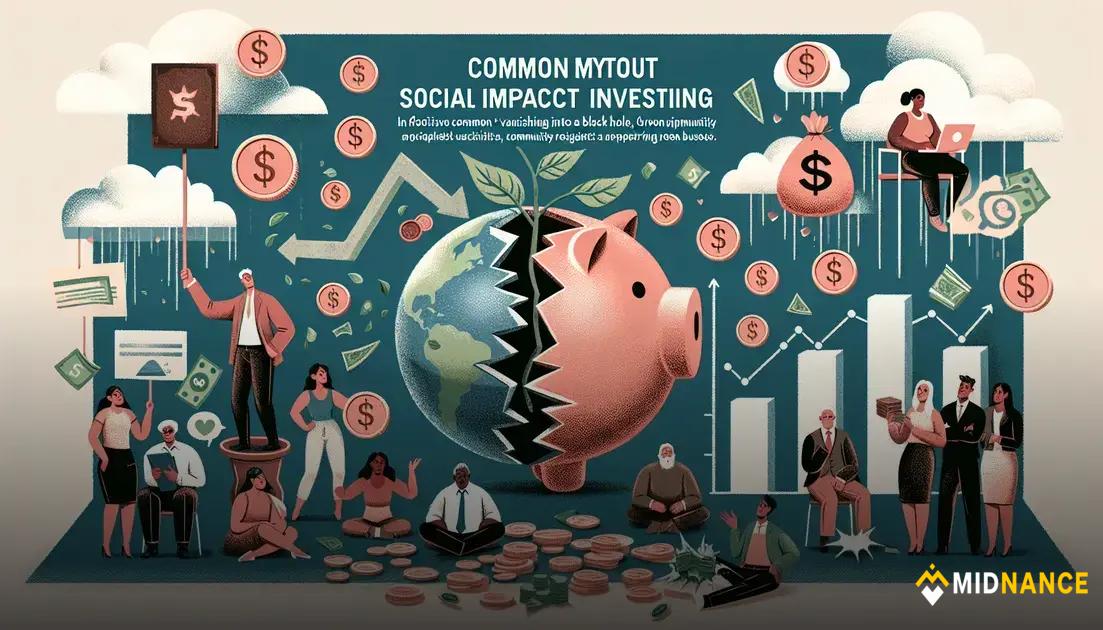Social impact investing is transforming the way we invest, offering not only financial returns but also positive societal outcomes. By focusing on investments that generate social and environmental impact, investors are contributing to sustainable development while also earning profits.
Understanding social impact investing
Social impact investing focuses on creating positive social or environmental changes alongside financial returns. This form of investment goes beyond seeking profits, aiming to support projects or organisations that can make a tangible difference in society. For investors, it’s vital to balance profitability with the potential social impact of their investments.
Understanding the core principles of social impact investing is essential. Investors need to evaluate the social issues they wish to address. These can range from environmental sustainability to education and healthcare improvements. By prioritising these areas, investors can target their resources effectively.
The underlying strategies often include investing in organisations that are transparent and committed to measurable outcomes. This transparency is crucial, as it allows investors to track the impact their funds are making. Measuring success in social impact investing is not merely about financial returns but also about the positive change facilitated by their investments.
Furthermore, investors must consider both the short-term and long-term impact of their investments. While some projects may offer immediate benefits, others could take years to manifest their full potential. Alignment with long-term goals is crucial for sustained social impact.
Key benefits of social impact investing

Financial Returns and Social Good: Social impact investing offers the opportunity to earn financial returns while making a positive social impact. Investors can support companies that address critical social issues such as education, healthcare, and environmental sustainability.
Diversification: Including social impact investments in a portfolio can diversify risks. These investments often operate in different sectors and geographical regions, helping to spread potential risks.
Social Responsibility: Social impact investing allows individuals and organisations to align their investments with their values. Investors can choose projects that reflect their commitment to social responsibility and ethical standards.
Attracting Talent: Companies that focus on social impact often attract top talent who are looking for meaningful work. This can foster a more motivated and dedicated workforce, boosting productivity.
Encouraging Innovation: Social impact investing encourages innovation by funding startups and enterprises that are tackling social challenges in novel ways. This can lead to the development of breakthrough solutions.
Policy Influence: Investors in social impact projects can play a role in influencing public policy and driving systemic change. Their financial support can help scale initiatives that would otherwise struggle to get off the ground.
Long-term Value: Social impact investments often focus on creating long-term value rather than short-term gains. This sustainable approach can lead to more stable and consistent returns over time.
How to get started with social impact investing
To begin with social impact investing, start by understanding your financial goals and the impact you want to achieve. Research different ventures and their social missions. Look at their past performances and future potentials. Evaluate if their values align with yours. Ensure you diversify your investment portfolio by including a mix of high, medium, and low-risk ventures. Understand the risks and potential returns associated with each.
Engage with financial advisors who specialize in social impact investments. They can provide valuable advice and insights. Utilise online platforms and tools to track the performance and impact of your investments. Don’t hesitate to start small. Begin with smaller investments and gradually increase as you grow comfortable and more informed.
Monitor and Adjust
Regularly assess the performance of your investments. Be open to making adjustments based on the social and financial outcomes. Engage with the communities and causes you are supporting to understand the actual impact of your investments.
Common myths about social impact investing

Myth 1: Social Impact Investing Yields Lower Returns
Many believe that social impact investing sacrifices financial returns for social good. However, numerous studies show that investing in socially responsible companies can bring competitive returns.
Myth 2: It’s Only for the Wealthy
A common misconception is that only the wealthy can engage in social impact investing. Today, there are numerous investment platforms and funds that cater to investors of all sizes.
Myth 3: Social Impact Investing Is the Same as Charity
While both aim to create positive change, social impact investing expects financial returns alongside social good. Charity often involves no expectation of financial return.
Myth 4: It’s a New and Untested Field
Despite its recent popularity, social impact investing has been around for decades. Historical data shows various success stories of businesses driven by social causes.
Myth 5: Difficult to Measure Impact
Many think it’s hard to measure social impact. With advanced metrics and tools, tracking and measuring impact is more accessible than ever. Metrics like ESG (Environmental, Social, and Governance) scores help quantify impact.
Myth 6: Limited Investment Opportunities
In reality, the pool of opportunities is growing rapidly. Sectors like renewable energy, education, and healthcare offer vast potential for impact and profit.
Myth 7: No Clear Definition
Some believe there’s no standard definition of social impact investing. Organisations and industry leaders have established clear guidelines and frameworks, providing consistency and trust.
The future of social impact investing
The future of social impact investing holds exciting possibilities and unprecedented opportunities. As we move forward, we expect to see a rise in the integration of technology and data analytics, which will help investors make more informed decisions and measure impact more accurately.
Emerging markets are poised to benefit greatly from increased social impact investments. These regions often have untapped potential for growth and innovation, making them prime candidates for investments that not only yield financial returns but also drive positive social change.
Another significant trend is the growing involvement of younger generations. Millennials and Gen Z are more likely to consider social and environmental factors in their investment decisions. This shift is likely to influence the broader market, encouraging more traditional investors to also factor in social impact as a key component of their strategies.
Collaborative efforts among investors, non-profits, and governmental bodies will become more prevalent. These partnerships can amplify the positive effects of social impact investing by pooling resources and expertise, leading to more significant and sustainable outcomes.
Lastly, we can anticipate advances in regulatory frameworks. Governments and international bodies are beginning to recognize the benefits of social impact investing and will likely introduce policies and incentives to further encourage its growth. This evolving landscape presents an opportunity for investors to not only profit but also contribute to a more equitable and sustainable future.





